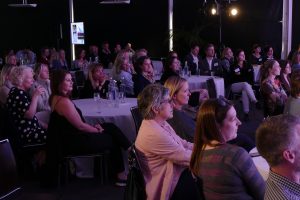BBC Sport speaks out on evolving women’s cricket broadcasting and taking advantage of storytelling twists
BBC Sport recently spoke about the evolution of the women’s game of cricket at Lord’s in late May, at the most recent SVG Europe Women event. The difficulty of balancing the need to increase viewership of the women’s game through telling players’ unique stories as they transition into the professional era of the women’s sport, while also treating them as the professionals that they are, was highlighted as one of the challenges as well as advantages of taking the women’s game forward.

At the SVG Europe Women event at Lord’s, the panel speak about the evolution of women’s cricket at the BBC during the session titled, From long wave to digital: Exploring the BBC’s evolving coverage of cricket now and going forward. Heather McLean speaks with Isabelle Westbury, sports broadcaster and former Middlesex Captain, Henry Moeran, BBC Sport Test Match Special producer, and BBC Sport’s Dominique Middleton, head of production for radio, digital and cricket
The speakers, BBC Sport’s Dominique Middleton, head of production for radio, digital and cricket; Henry Moeran, BBC Sport Test Match Special producer; and Isabelle Westbury, sports broadcaster and former Middlesex Captain, said the women’s game is now being treated exactly the same in broadcasting terms as the men’s, marking a turning point, however they added it is exciting at this stage in the game’s evolution to have access to members of female teams who are happy to talk, enabling the BBC to build stories around them, encouraging fan engagement and interest in the women’s game.
Fast changing times at the BBC
In the session, From long wave to digital: Exploring the BBC’s evolving coverage of cricket now and going forward, chaired by Heather McLean, SVG Europe editor and internal head of SVG Europe Women, the panellists looked at how the BBC has moved its holistic approach to broadcasting cricket forwards, from radio to digital and as of 2020, back to live and highlights television. As the oldest broadcaster in the UK, the BBC has a solid history of providing sports reporting from radio to TV and now digital and on social media.
Moeran commented on the BBC’s coverage of cricket over the years that, “in recent years in particular it’s been [more about] the evolution of the women’s coverage. I’ve been doing a little bit of research on this; the first time that Jonathan Agnew, BBC cricket correspondent, covered a women’s game was as far back as 1993 – the World Cup Final here – which I was really surprised at actually because it seems like earlier than you would expect.
“We had Ali Mitchell present as the only journalist at the 2005 World Cup in South Africa as well, which seems remarkable now when you go to ICC women’s events and they’re full of broadcast journalists from all over the world, and it’s just such a change in such a short amount of time,” he went on.
“In terms of what [the BBC does] now with the women’s game and our coverage, is we treat an international women’s game as exactly the same as a men’s game,” noted Moeran. “For the Women’s Ashes we will have the same broadcast facilities [as the men’s games], we’ll have radio mics, we’ll have online clips, we’ll have digital highlights, everything, because in terms of our audience it’s what they want, and in terms of what we want to do as the BBC it’s what we want to do. Sky do the same; they will treat it in exactly the same way [as the men’s game].”
He said that coverage of women’s cricket has changed in an extraordinarily short space of time. “The first women’s tournament I covered was in 2013 in India [where] we were the only broadcaster there in radio, and in five or six years it’s gone from that to now, where everywhere you look, every broadcaster is embracing it and it’s an extraordinary transformation.”
On what is driving this interest in women’s cricket, Westbury commented: “I think it’s just people realising that it’s there. For a long time as a player, first in women’s cricket then into its coverage, we kept saying if you actually watched us, you’d enjoy it too, just like any other form of cricket. I think that as that’s slowly happened over the years people have realised, yes, there’s some really thrilling stuff in there.”

Heather McLean speaks with Isabelle Westbury, sports broadcaster and former Middlesex Captain, during SVG Europe Women at Lord’s on the panel titled, From long wave to digital: Exploring the BBC’s evolving coverage of cricket now and going forward
Summer of women’s sport
On the BBC’s Change the Game women’s summer of sport advertising campaign, the BBC is taking advantage of a prolific season of women’s sport this year. The BBC is the broadcaster for the Women’s World Cup in France, it is sharing broadcasting rights with Sky to the Women’s Netball World Cup, it has the radio rights for the Women’s Ashes, “and those are just the extra events,” noted Middleton, who added there are also tournaments including Wimbledon and the IAAF Athletics.
“So in terms of a single summer of women’s sport, it was a brilliant opportunity for us to be able to profile something that’s very important to us,” Middleton said. “Because we think that we have to reflect society; it’s part of our public service remit. But it’s also something the audience wants us to do and expects us to do. So the Change the Game campaign is celebrating all the live sport [we broadcast] but it also gives us the opportunity to feature women’s sport through journalism; there’s a whole raft of original journalism that’s being profiled on the BBC and bespoke content [on iPlayer, series like Legends and Rebel Girls].”
No more patronising coverage
Women’s sport is moving ahead quickly, noted Westbury, with players and teams being no longer being patronised and celebrated just for making it to the pitch. She explained: “We’re at a stage, not just in cricket but in all other sports, where it’s a turning point — it’s a very cliched expression – but we’ve just transformed from that stage where we were celebrating the coverage of women’s sport, as in, “well done, we’re there,” to actually treating it like a sport, analysing every sport we cover, the good bits, the bad bits, and the way in which it has been done historically in men’s sport… as in that was a great shot or that wasn’t a great shot.”
Later on in the conversation Westbury noted that it was vital that women were held to the same high, professional standards as male players. “It’s that culture change that’s difficult to influence,” Westbury went on. “In cricket I think it probably happened a couple of years ago, 2015 perhaps, where ironically the England women were playing in an Ashes series but they didn’t perform to the level that perhaps they were expected, but it gave an opportunity for us as broadcasters covering the game to treat it as we would the men’s game, and I think the BBC have been pioneers in that,” she added.
Moeran, referring to the 2015 Ashes mentioned by Westbury, added: “I remember very clearly Charles Dagnall, one of our commentators [at that 2015 Ashes tournament] spoke to the England captain at the time, Charlotte Edwards, at the end of the test match in Canterbury, and actually gave her quite a tough interview. She was upset at the end of it because she’d not had that before, that sort of “why were you not good enough, that’s not good enough, people have expectations of you now”.”
Continuing, Moeran said: “In some respects the best responses we get on social media and the most satisfying from our point of view are when people either complain that we can’t cover a women’s game, because perhaps we don’t have the resources – there was a recent series in Sri Lanka where unfortunately, in Sri Lanka they didn’t put the matches in facilities that would allow for broadcast so we couldn’t do it – or if the team don’t perform. It’s really nice seeing cricket fans saying, “that’s a terrible shot,” because you know they are about the sport for what it is, and as Izzie said, it’s not just looking and saying isn’t it nice that the sport’s taking place. Over the last two or three years we’ve seen the most extraordinary shift in attitudes not just in the media, but in the watching public as well,” he said.

Part of the the 200-strong audience at SVG Europe Women at Lord’s
Storytelling opportunities
Partly because the women’s game in broadcasting standards is in its infancy compared to the men’s game, there is great access to the players for journalists, who are able to spend time with the players, get to know them, and therefore produce interesting, personal interviews with them.
The BBC has been able to bring in the background stories of the women in the teams as well as the teams themselves, which is helping to move the game forward, said Middleton, who noted, “I think that’s what we’re getting better at; we’re now telling stories. That’s why sport’s fantastic, that’s why we all love sport, it’s because of the drama in it, and so we’re telling these great stories and the audience want the great stories and they don’t care about gender, they don’t care about ethnicity, they don’t care about sexuality. They just want great stories and great drama, and that’s our job, to deliver that.”
Middleton noted that the accessibility to female players is excellent right now. Having genuine interviews with players provides what viewers want, “genuine interaction”. She added: “Sometimes with the male athletes you can get the media trained response, so you won’t actually get much of an answer because you know they’ve been very well briefed. I think at the moment with female athletes we’ve still got that very genuine interaction.”
Creating balance
On one hand there is the need to drive more viewers and more interest towards the women’s game of cricket, while on the other there is the need to balance that with treating them as the professional s that they are. On whether the BBC has felt the need to broadcast women’s cricket using a different approach to the men’s in a way that could possibly help drive fan engagement while also raising the credibility of the women’s game, Westbury said it is complicated.
She explained: “I think that’s a really interesting question. In a way you want women’s sport to be [treated as] professional since the age of dot, like men’s sport has, but actually the fact that we’re going through this transition phase where a lot of the women playing cricket, playing football, playing rugby, and other sports, have come from an amateur era into a semi-professional era and now a lot of them are professional, that means that their stories are quite often much more interesting than the men, and you want to capitalise on that. I think that’s [being] done, but you also don’t want to detract from the fact that they are now fully fledged professionals and we want to treat them on that same level.”
Moeran commented on a conversation where radio and TV broadcasters at a recent ICC event were discussing an instruction given to some TV commentators by a broadcaster, who were told not to say anything negative about the players’ performances and to, “really sell everything that happens”.

SVG Europe Women at Lord’s with BBC Sport, From long wave to digital: Exploring the BBC’s cricket coverage evolution
However, he said: “We were talking about it as a group of broadcasters, and actually I think the overall consensus was that you’re doing a disservice to women’s sport [if you do that].
“You always have to think about that moment where if someone tunes in on the radio or on TV for the first time and sees someone dropping a catch that they should catch. [If] that is their first introduction to women’s sport and you don’t say, “they should have caught that,” you’re not doing the sport a service,” continued Moeran.
“You will see as good a catch in the women’s game as in the men’s game; you will see as good a shot in the women’s game as in the men’s game. The most important thing that you can do is to offer praise when something’s brilliant and criticism when something’s not. If you treat it seriously as a broadcaster, the watching public will treat it seriously as well,” he noted.
Concluding, Middleton said that the BBC is working on its plans for TV coverage from next year, when there will be over 100 hours of cricket back on BBC TV including for The Hundred, the ICC’s new competition. She said at this early stage it is, “all about the partnerships”, referring to those with the ECB, Sky and the independent tech sector.
“It feels like a real privilege to be involved in a sporting event that’s new…. We also have a remit to increase and encourage participation, and so to have conversations with Sky and with the ECB about what are we going to do to try and encourage people to try cricket, it’s very, very exciting, and it’s a real privilege to be in this position.”

